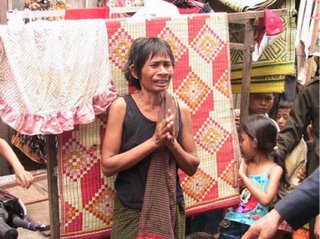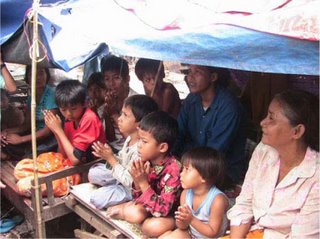Territorial dispute could be resolved if it wasn't used by leaders on each side to divert attention from internal issues
For a man who has been holding an iron grip on Cambodia's highest political posts for over a decade, one would think that Prime Minister Hun Sen had learned a thing or two about statesmanship. Unfortunately, judging from his latest statement in reference to Thailand, this hasn't been the case.
Hun Sen on Monday ordered his troops to shoot any trespassers, civilians or military, in a simmering border dispute with Thailand.
"If they enter again, they will be shot," the Cambodian strongman told officials, who responded to this statement with applause.
"Troops, police and all armed forces must adhere to the order ... for invaders, shields are not used but bullets are used," Hun Sen said in the speech at the opening ceremony for Cambodia's new Ministry of Tourism building.
He also said he might raise the issue at the Association of Southeast Asian Nations (Asean) meeting next month, and added that if Thai Prime Minister Abhisit Vejjajiva displays a map that suggests that overlapping, disputed territory (around the historic Preah Vihear temple) is in Thailand, he would tear it up.
Hun Sen's remarks came just over a week after scores of yellow- shirted People's Alliance for Democracy (PAD) protesters rallied at the disputed border area near the 11th-century Preah Vihear temple to demand that Thai troops reclaim the 4.6-square kilometre overlapping patch of land.
It didn't seem to bother the PAD protesters that the area is the site of clashes that have claimed the lives of seven soldiers since tensions flared last year.
This long-running territorial dispute heated up in July last year when Unesco, the United Nations cultural agency, approved Cambodia's bid to have the temple listed as a World Heritage site.
The previous government of Samak Sundaravej initially supported the Cambodian bid until a Thai court ruled that the endorsement was unconstitutional because the Parliament had not approved it.
Besides these technical obstacles to the endorsement, the then foreign minister, Noppadon Pattama, also faced a massive street protest by the yellow shirts, who accused him of cosying up to Phnom Penh in exchange for better relations that could translate into lucrative deals for Thaksin Shinawatra and his family's investments in Cambodia.
Both sides rushed troops to the border, which resulted in several minor gun battles.
Some international observers say that Hun Sen has been frustrated at home because the UN genocide tribunal investigating the former Khmer Rogue regime - of which he was once a member - would like to go after more suspects accused of committing crimes against humanity. The Khmer Rouge ruled Cambodia from 1975 to 1979 in an orgy of killing, before being ousted by a Vietnamese invasion. Hun Sen going after Thailand, as well as the country's leaders and ministers, is seen as an attempt to stir up nationalism and divert attention elsewhere, some observers say.
But such a tactic is not exclusive to Cambodia. Thai leaders, such as Thaksin Shinawatra, have employed this kind of smoke screen when the international community corners them. Needless to say, these tactics don't resolve anything. The problem doesn't go away.
If anything, Hun Sen's un-statesman-like comment this past Monday was indicative of how the Cambodian strongman provokes Thailand at a time when the Thai people are at each other's throats. We hate to admit it, but his doing so deepens this internal wound of ours, which only we Thais ourselves can heal.
Of course we can't put all the blame on Hun Sen. Furthermore, bad taste is not a crime.
The people of Thailand are going to have to work this thing out by themselves. If we could only turn the clock back, we would surely agree that it would be a mistake to politicise the border issue.
The entire nation is divided, not only on internal political and social issues, but also this border dispute. One of the reasons why we can't come up with a common understanding, much less common policy, is because we have permitted our political leaders to politicise it from the beginning.
What both sides should have done was to let technical experts resolve the problem.
The current course taken by Thailand and Cambodia is a lose-lose one, whatever way we look at it. To save time and heartache, as well as to prevent possible further loss of life, both sides need to put a lid on the war of words, sit down and work out the issues quietly - like mature and modern countries are supposed to do.
















